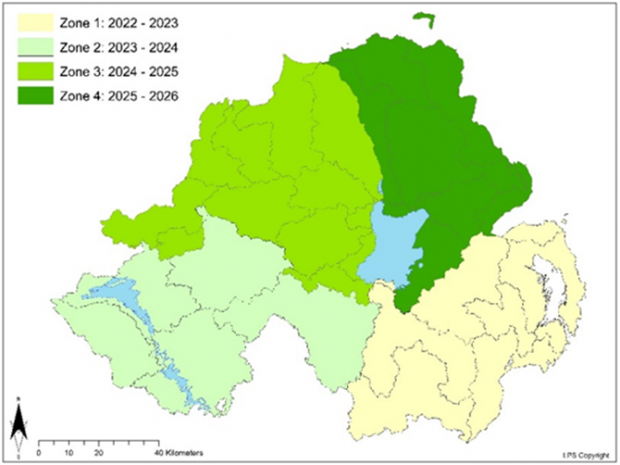The Soil Nutrient Health Scheme (SNHS) continues to roll out across Northern Ireland with soil sampling underway in Zone 3, covering north Co. Tyrone and Co. Derry/Londonderry, as well as farms in Zone 1 and Zone 2 that were not previously sampled.

Since its launch in 2022, approximately 300,000 fields have been sampled and over 18,000 farm businesses have registered. Sampling will typically be carried out between November and February with results sent to farmers within 4-6 weeks. Thereafter results and maps for each farm will be available online through the farm Government Gateway account.
The soil reports contain essential information on soil nutrient status, including soil pH, soil phosphorus, potassium and sulphur levels. Sampling Programme Project Lead, Alex Higgins, identified some of the trends thus far:
“The average pH in Zone 2, for those fields eligible for liming, was 5.75, and in Zone 1 it was slightly higher at 5.91, reflecting variations in farm enterprises and physical conditions, such as higher rainfall, as you move west. In general, the average pH across both zones sits below the optimum levels which would be most effective at maximising nutrient uptake. For intensive grass or silage fields, lime applications are one of the quickest and most cost-effective methods to increase nutrient use efficiency.”

The role of phosphorus in ongoing water quality issues in NI was highlighted by Dr. Rachel Cassidy, Scientific Lead on the SNHS who further explains “Optimising pH will improve the efficiency of uptake of nutrients in soils, including phosphorus (P). In large areas of both zones, soil P Indices are above optimum (> 26 mg/l Olsen P, Index 3), with the average soil P in Zone 1 being 28.2 mg/l and in Zone 2 being 24.3 mg/l. Considering ongoing concerns over Lough Neagh farmers are encouraged to carefully consider their P applications and to use the results in conjunction with the online runoff risk maps which indicate areas of fields most at risk of nutrient loss during rainfall.”
Farmers are encouraged to complete their CAFRE SNHS training as soon as possible. To register visit CAFRE. Failure to register for SNHS and complete the training may affect your future payments.
AFBI will have a stand at the Winter Fair in the Eikon Centre on 12th December where you can meet SNHS representatives from AFBI and CAFRE. Farmers can contact the AFBI Helpdesk or see AFBI SNHS on the AFBI website.
Notes to editors:
AFBI is an arms-length body of DAERA delivering research and development, diagnostic and analytical testing, emergency response capability and expert scientific advice for DAERA and other government departments, public bodies and commercial companies in Northern Ireland, and further afield.
AFBI’s Vision is “Advancing the Local and Global Agri-Food Sectors Through Scientific Excellence”.
AFBI’s core areas:
- Leading improvements in the agri-food industry to improve its sustainability;
- Protecting animal, plant and human health;
- Enhancing the natural and marine environment.
Latest news
- AFBI Hillsborough host AERA committee 27 March 2025
- The Omics Days Conference 27 March 2025
- Resilience, Sustainability and Innovation survey 03 March 2025
- AFBI led Project Launched to Promote Sustainable Dairy Farming across the UK 18 February 2025
